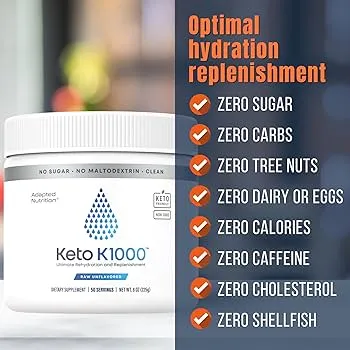The Importance of Electrolytes on a keto diet: How to Stay Hydrated
Introduction
The ketogenic diet, or keto diet, has gained popularity in recent years as an effective way to lose weight and improve overall health. This high-fat, low-carb diet forces the body to burn fat for fuel instead of carbohydrates, resulting in weight loss and other health benefits. However, one potential downside of the keto diet is the risk of electrolyte imbalances, which can lead to dehydration and other health issues. In this article, we will explore the importance of electrolytes on a keto diet and provide tips on how to stay hydrated while following this eating plan.
What are Electrolytes?
Electrolytes are minerals that carry an electric charge and play a crucial role in maintaining various bodily functions. These include sodium, potassium, magnesium, and calcium. Electrolytes help regulate fluid balance, nerve function, muscle contractions, and pH levels in the body. When you are on a keto diet, your body burns through glycogen stores and releases water, which can lead to an imbalance of electrolytes if not properly replenished.
Importance of Electrolytes on a keto diet
Maintaining proper electrolyte balance is essential for overall health, especially when following a keto diet. Electrolyte imbalances can lead to dehydration, muscle cramps, fatigue, and other health issues. Here are some key reasons why electrolytes are important on a keto diet:
1. Hydration: Electrolytes help regulate fluid balance in the body, which is crucial for staying hydrated. When you are on a keto diet, your body excretes more water, making it even more important to replenish electrolytes to prevent dehydration.
2. Muscle Function: Electrolytes play a key role in muscle contractions and nerve function. Without adequate electrolytes, you may experience muscle cramps, weakness, and fatigue, which can hinder your workouts and overall performance.
3. Energy Production: Electrolytes are essential for energy production in the body. When you are on a keto diet, your body relies on fat for fuel instead of carbohydrates. Adequate electrolyte levels help support energy production and prevent fatigue.
4. pH Balance: Electrolytes help regulate the pH levels in the body, which is important for overall health. Imbalances in pH levels can lead to acidosis or alkalosis, which can have serious consequences on your health.
How to Stay Hydrated on a keto diet
Now that we understand the importance of electrolytes on a keto diet, let’s explore some tips on how to stay hydrated and maintain proper electrolyte balance:
1. Drink Plenty of Water: Staying hydrated is key to maintaining electrolyte balance on a keto diet. Aim to drink at least 8-10 glasses of water per day, or more if you are active or live in a hot climate.
2. Replenish Electrolytes: In addition to water, it is important to replenish electrolytes through foods or supplements. Foods high in electrolytes include leafy greens, avocados, nuts, seeds, and seafood. You can also consider taking electrolyte supplements to ensure you are getting an adequate amount.
3. Add Salt to Your Meals: Sodium is a key electrolyte that is often lacking on a keto diet. Adding salt to your meals or drinking broth can help replenish sodium levels and prevent dehydration.
4. Eat Potassium-Rich Foods: Potassium is another important electrolyte that is essential for muscle function and overall health. Foods high in potassium include avocados, spinach, broccoli, and salmon.
5. Consider Magnesium Supplements: Magnesium is a crucial electrolyte that is often depleted on a keto diet. Consider taking a magnesium supplement to ensure you are getting an adequate amount.
FAQs
Q: Can I drink sports drinks on a keto diet?
A: Most sports drinks are high in sugar and carbohydrates, which are not compatible with a keto diet. Instead, opt for electrolyte supplements or homemade electrolyte drinks to replenish electrolytes.
Q: How can I tell if I am dehydrated on a keto diet?
A: Signs of dehydration include dark urine, dry mouth, fatigue, muscle cramps, and headache. If you experience any of these symptoms, increase your water intake and replenish electrolytes.
Q: Can I overhydrate on a keto diet?
A: While it is important to stay hydrated, it is possible to overhydrate, which can lead to electrolyte imbalances. Listen to your body and drink water when you are thirsty, and replenish electrolytes as needed.
Conclusion
In conclusion, maintaining proper electrolyte balance is essential for overall health, especially when following a keto diet. Electrolytes play a crucial role in hydration, muscle function, energy production, and pH balance in the body. By staying hydrated and replenishing electrolytes through foods or supplements, you can prevent dehydration and other health issues while on a keto diet. Remember to listen to your body and adjust your water and electrolyte intake as needed to stay healthy and energized.

